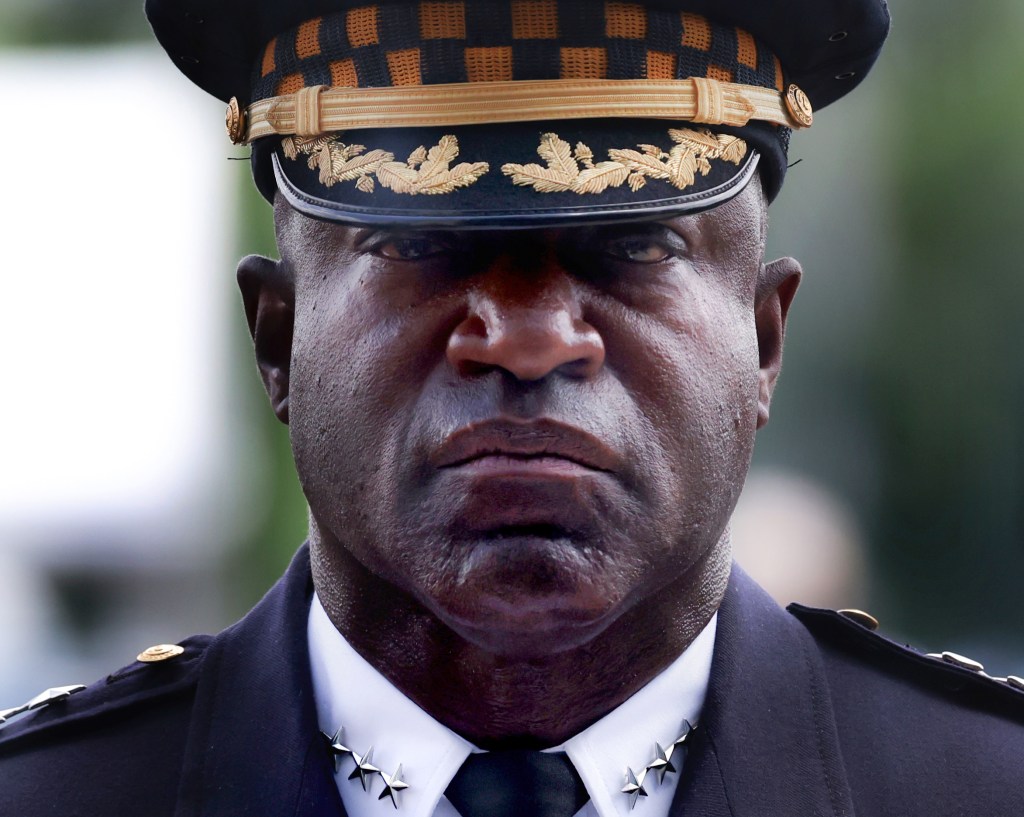In these contentious times, it takes a lot to unify a state’s political and civic establishment around a single idea. So, bottom line, credit President Donald Trump with this: His threat to sic the National Guard on Chicago has unified our city and state to rally to the city’s defense.
But if we’re honest with ourselves and each other, Trump’s provocation also should provide occasion for a clear-eyed assessment of just how far the city needs to go in order to reduce violent crime to more acceptable levels.
There they were Tuesday, along the Chicago River with the Trump Tower in the background: Gov. JB Pritzker, Mayor Brandon Johnson, Attorney General Kwame Raoul, two U.S. senators, a passel of congressmen, state and local elected officials, and a legion of other leaders.
They declared Trump’s plan lawless and reckless; anti-democratic and anti-Chicago; racist and ruthless. And to a person, they called the president’s bluffs.
Chicago is not, as Trump insists, “a killing field.” People in Chicago are not “screaming for (the feds) to come,” they said, as Trump claimed.
The inconvenient truth for Trump is that violent crime in Chicago is falling dramatically, from recent spikes during the pandemic.
Homicides are down 32% year over year; nonfatal shootings are down 38%. Carjackings are down nearly by half, according to Chicago Police Department data. Chicago police are clearing more cases more quickly. And the new Cook County state’s attorney, Eileen O’Neill Burke, is prosecuting crimes more readily than her predecessor did.
Such facts may give comfort to the people who believe Trump has no cause to deploy the Guard to Chicago’s streets. If he does, and if the Illinois attorney general carries out a commitment to sue him for it, there’s a good chance Raoul would prevail.
Trump may have lawless intent. But that hardly means the residents of Chicago should accept the level of lawlessness on the city’s streets.
Despite the recent improvements, crime is still a major problem in Chicago. Neighborhoods that previously felt protected from violent crime are still seeing increased incidents, police data shows. The level of violence in the most challenged communities is unacceptable by any measure. CPD and the state’s attorney’s office are coordinating better than they did under Kim Foxx when she was state’s attorney, but they need to make further progress in prosecuting crimes.
Based on interviews and a review of data, Chicago’s crime statistics are showing a positive trend thanks to reforms arising from improved compliance with the court-monitored police consent decree; tactical and strategic shifts under police Superintendent Larry Snelling; the beneficial effects of a large investment in community-based violence intervention efforts; and the tougher-on-crime approach by O’Neill Burke.
Even so, there is a long way to go. Yes, compliance with the consent decree is improving — reaching full compliance with 16% of the decree and substantial compliance with more than half the items in the 799-paragraph document, a recent report reveals. But that hardly means we should be satisfied with the rate of progress, six long years after the decree took on the force of law.
To accelerate the reforms would require political will — a will Johnson may lack, the evidence suggests. After all, in his 2025 budget, Johnson proposed cutting staffing in a key CPD compliance department by more than half, a cut he was forced to reverse after a threat by Raoul to hold the city in contempt of court if Johnson moved ahead with the cuts.
Tight budgets are raising concerns about the city’s commitment to further investment. A much-touted $300 million commitment to community violence intervention — $200 million from the city and state and $100 million from private sources over five years — may see a delayed impact, sources told me, because the city’s public health department, which distributes funds to local groups that fight violence, is under pressure to cut spending on the programs and scaling back on the number of neighborhoods targeted for investment.
Cutbacks at the federal level are making matters worse. The Trump administration has cut nearly $160 million in allocations to violence intervention groups in Chicago and nationwide. And Robert Boik, former leader of CPD’s constitutional policing office who is now at the Civic Committee of the Commercial Club of Chicago, also noted concerns about cutbacks at federal agencies devoted to enforcement of drug and handgun laws.
Inspector General Deborah Witzburg, who served as deputy IG for public safety before rising to her current job, said effective reform of policing requires a combination of adequate funding and political will — neither of which is assured. CPD currently has about 1,000 vacant positions, or 7% of the total allocated workforce.
“Reform is not a wish-for-it exercise. There’s work to do, and there have to be people to do it,” Witzburg said during an appearance at the City Club this week. “We’ve got to fill those jobs. We’ve got to have the people to do the work, and there has to be the political will to make it happen.”
Some pieces are coming into place. Boik is working with the Police Department on a workforce allocation study that should help Snelling more effectively deploy patrol officers. There’s a new emphasis on acquiring the digital tools needed for modern policing. O’Neill Burke’s commitment to bringing cases, and holding the accused in jail while they await trial, is rebuilding trust with Chicago’s police.
In short, Trump’s claim of a crisis that calls for the National Guard is false on its face. But some good could come from this episode if the city and its leaders double down on making Chicago more safe — securing the improvements that have been made, and accelerating toward a state of safety that this city deserves.
David Greising is president of the Better Government Association.
Submit a letter, of no more than 400 words, to the editor here or email letters@chicagotribune.com.
